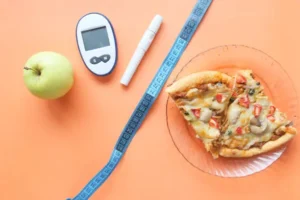Managing diabetes isn’t just about avoiding sugar—it’s about giving your body the right fuel to keep everything running smoothly. If you’ve ever asked, “What’s the real goal of a diabetic diet?” — you’re in the right place. Let’s break it down. Goal of a Diabetic Diet
Understanding Diabetes
Types of Diabetes
Diabetes is a chronic condition, but it’s not a one-size-fits-all situation.
Type 1 Diabetes
This type happens when the body stops making insulin. It’s usually diagnosed in children or young adults and requires daily insulin therapy.
Type 2 Diabetes
This is the more common form and usually develops in adults. The body still makes insulin but doesn’t use it well.
Gestational Diabetes
This pops up during pregnancy and usually disappears after birth, but it raises your risk for Type 2 diabetes later.
How Blood Sugar Works in the Body
When you eat carbs, your body breaks them into glucose (sugar), which enters your bloodstream. Insulin helps move that sugar into your cells for energy. If your body doesn’t make or respond to insulin properly, sugar builds up in the blood—leading to diabetes.
Introduction to Diabetic Diets
What Is a Diabetic Diet?
A diabetic diet isn’t a strict meal plan—it’s a smart eating pattern designed to stabilize blood sugar, support weight management, and reduce the risk of complications.
How Is It Different from Other Diets?
It emphasizes complex carbs, fiber-rich foods, lean proteins, and healthy fats while limiting simple sugars and processed junk.
Is a Diabetic Diet Only for Diabetics?
Nope! It’s a healthy way for anyone to eat. Think of it as a balanced, mindful diet for better health.
Primary Goals of a Diabetic Diet
Blood Sugar Control
The top goal is to keep your blood sugar within a healthy range throughout the day. Consistent levels mean fewer complications.
Weight Management
Extra weight can worsen insulin resistance. A diabetic diet helps you maintain or lose weight sustainably.
Preventing Complications
By managing your diet, you lower your risk of heart disease, kidney damage, nerve issues, and vision problems.

Improving Insulin Sensitivity
Certain foods and nutrients can help your body respond better to insulin—meaning you need less of it to do the job.
Essential Nutrients in a Diabetic Diet
Carbohydrates – Not All Are Bad
Focus on complex carbs like whole grains, legumes, and veggies. Avoid refined sugars and white flour.
Proteins – The Stable Energy Source
Lean proteins like chicken, fish, tofu, and legumes help you stay full and support muscle health.
Fats – Choosing the Right Kind
Healthy fats (avocados, nuts, olive oil) support heart health and help absorb nutrients. Say no to trans fats!
Fiber – The Blood Sugar Stabilizer
Fiber slows down sugar absorption. Aim for fruits with skin, leafy greens, seeds, and whole grains.
Planning a Diabetic-Friendly Meal
Portion Control and Plate Method
Half your plate = veggies, 1/4 = lean protein, 1/4 = healthy carb. Easy, right?
Counting Carbs the Easy Way
Start with 45–60 grams of carbs per meal and adjust based on your doctor’s advice.
Glycemic Index – Why It Matters
Choose low-GI foods that don’t spike blood sugar fast. Think sweet potatoes instead of fries.
Foods to Eat and Avoid
Best Foods for Diabetics
Leafy greens
Berries
Whole grains
Fatty fish
Greek yogurt
Foods to Minimize or Eliminate
White bread
Candy and pastries
Fried foods
Full-fat dairy
Smart Snack Choices
Try:
Apple slices with peanut butter
Hummus and veggies
Hard-boiled eggs
A handful of almonds
Managing Cravings and Emotional Eating
Tips to Stay on Track
Don’t skip meals.
Stay hydrated.
Keep healthy snacks ready.
Dealing with Sugar Cravings
Craving sweets? Opt for dark chocolate or a piece of fruit. Over time, your taste buds adjust!
Exercise and the Diabetic Diet
Why Movement Matters
Exercise helps lower blood sugar naturally and improves insulin sensitivity.
Balancing Food and Activity
Don’t work out on an empty stomach. Pair activity with small carb-rich snacks to avoid drops in blood sugar.
Benefits of a Diabetic Diet Beyond Diabetes
Heart Health
Less sugar and bad fats = lower cholesterol and blood pressure.
Improved Energy and Mood
Balanced blood sugar means fewer crashes and better focus.
Longevity and Disease Prevention
A diabetic-friendly diet lowers the risks of stroke, cancer, and Alzheimer’s.

Diabetic Diet Myths Debunked
“You Can’t Eat Carbs”
False! The type and amount matter more than cutting them out completely.
“Diabetic Food” Labels Are Always Healthy
Many of these are still packed with carbs or unhealthy fats.
“You Must Avoid Fruit”
Whole fruits (not juices) in moderation are totally fine—and packed with fiber!
Creating a Personalized Diabetic Diet Plan
Working with a Dietitian
A pro can tailor your plan to your body, goals, and culture.
Using Food Journals and Apps
Tracking helps you see patterns, identify issues, and stay motivated. Goal of a Diabetic Diet
Cultural and Lifestyle Considerations
Adapting Traditional Cuisines
Love rice or roti? Switch to brown rice or whole wheat versions.
Eating Out or Traveling with Diabetes
Plan, research menus, and carry snacks or glucose tablets just in case.
Real-Life Diabetic Meal Plan Example (1-Day)
Breakfast
Oatmeal with berries and chia seeds
Black coffee or green tea
Lunch
Grilled chicken salad with olive oil vinaigrette
Whole wheat pita on the side
Snack
Cucumber slices and hummus
Dinner
Grilled salmon
Steamed broccoli
Quinoa
Dessert
A small bowl of mixed fruit
Long-Term Success with a Diabetic Diet
Building Habits, Not Restrictions
Focus on progress, not perfection. Small changes lead to big wins.
Staying Consistent and Flexible
Enjoy occasional treats mindfully. Consistency matters more than strictness.

Conclusion
So, what is the goal of a diabetic diet? It’s more than just managing blood sugar—it’s about empowering your life. With the right foods, balance, and mindset, you can feel better, live longer, and thrive despite diabetes. It’s not a punishment—it’s a path to wellness.
FAQs
1. Can I ever eat sugar again on a diabetic diet?
Yes, but in moderation. Natural sugars from fruits and occasional desserts are okay if planned properly.
2. How fast can a diabetic diet lower blood sugar?
Some people see improvements in just a few days, while others may take weeks. Consistency is key.
3. Is a diabetic diet good for weight loss?
Absolutely. It focuses on whole foods, portion control, and balanced nutrition—perfect for healthy weight loss.
4. Can a diabetic diet reverse Type 2 diabetes?
It can significantly improve or even reverse Type 2 diabetes in some cases, especially when combined with weight loss and exercise.
5. Are cheat days okay in a diabetic diet?
An occasional treat is fine. Just avoid bingeing and monitor your blood sugar closely.

